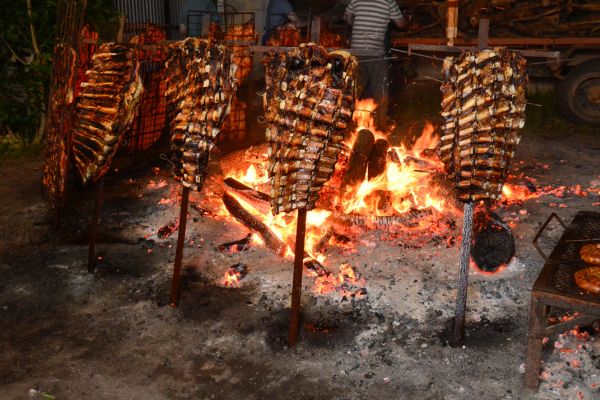In Southern Brazil, traditions are not only passed down through stories or rituals. They’re also preserved through the invisible language of scent.
Herbal fragrances have played a quiet but powerful role in maintaining Gaúcho identity across generations. These scents carry memories, beliefs, and customs, acting as cultural messengers that speak directly to the senses.
A Living Bridge Between Past and Present
Every community develops its own ways of preserving heritage. For Gaúchos, herbs are more than ingredients; they’re living connections to their ancestors.
When someone boils marcela for tea or burns rosemary during a cold evening, they’re repeating actions practiced centuries ago.
The aroma that fills the air is the same one their grandparents and great-grandparents once knew.
These repeated sensory experiences become part of the collective memory.
A single scent can instantly bridge the gap between modern life and ancestral practices. It’s not about nostalgia alone — it’s about keeping cultural roots alive in everyday life.
Herbal Scents as Cultural Timekeepers
Many Gaúcho traditions are tied to the rhythm of the seasons. Herbs play a central role in marking these transitions.
For example, during Easter week, families collect marcela from the fields, dry it, and store it for the year. The sweet, calming aroma becomes forever linked with that sacred time of renewal.
In winter, simmering pots with boldo, laurel, and citrus peel create a comforting scent that signals protection and family gatherings.
In summer, fresh herbs are hung to dry in kitchens, marking both abundance and preparation for the future. These fragrances act like cultural clocks, reminding communities of their seasonal cycles.
Scent as an Unspoken Teacher
Traditions are often taught through words or rituals, but herbal scents teach in silence. Children growing up in Gaúcho homes absorb cultural knowledge simply by being surrounded by these aromas.
They learn which herbs are collected during certain times, how they’re prepared, and when they’re used — without needing formal explanations.
Over time, this sensory learning becomes second nature. A child who remembers the smell of marcela drying in the sun will recognize it instantly as an adult. This unspoken transmission of knowledge ensures cultural continuity even when oral traditions fade.
Fragrance and Family Identity
Each family has its own “scent signature,” shaped by the herbs they use most. Some rely heavily on rosemary and citrus, creating a bright, fresh home atmosphere.
Others prefer earthy boldo or sweet marcela, evoking warmth and spiritual calm. These unique scent combinations become part of a family’s identity.
Visitors can often tell which family they’re visiting just by the fragrance inside the home. This olfactory fingerprint strengthens the sense of belonging and helps preserve subtle differences between households, even within the same community.
The Role of Rituals and Celebrations
Community celebrations and religious events often involve the deliberate use of herbs to create a specific emotional atmosphere.
During Easter, homes are perfumed with marcela and laurel. For patron saint festivals, boldo and rosemary are burned for purification and blessings.
These rituals go beyond decoration. They’re sensory experiences that anchor traditions in the minds and hearts of participants.
The repeated combination of herbs, prayers, and seasonal activities creates strong cultural imprints that last for decades.
Adaptation in Modern Times
While urban life has changed how people live, many Gaúchos are finding new ways to keep traditional scents alive.
Instead of wood stoves and simmering pots, they may use essential oil diffusers or handmade candles infused with marcela and rosemary. These modern tools allow traditions to evolve without losing their essence.
This adaptation keeps younger generations connected. Even if they don’t harvest herbs themselves, they can still experience the scents that define their cultural heritage. It’s a practical way to ensure traditions stay relevant in a changing world.
The Emotional Power of Ancestral Scents
Scent has a unique ability to evoke emotions instantly. For many Gaúchos living far from their hometowns, smelling a familiar herb can bring back vivid memories of family, landscapes, and childhood moments. It’s like opening a doorway to the past with a single breath.
This emotional power is crucial for preserving traditions in migrant communities. It helps maintain cultural identity even when people are physically distant from their ancestral lands. A bottle of marcela oil or a bundle of dried rosemary can carry entire histories across borders.
Passing Traditions Through Daily Life
Unlike formal ceremonies, the preservation of herbal scent traditions happens quietly through daily routines.
Boiling herbs for tea, drying bundles in the kitchen, or cleaning with fragrant infusions may seem ordinary, but these acts are carriers of culture. They keep ancestral knowledge alive in the most intimate spaces — the home.
This daily repetition ensures that traditions are not confined to special occasions. They become part of life’s rhythm, blending seamlessly into modern lifestyles while maintaining their cultural depth.
Why These Traditions Matter Today
In a globalized world where cultural practices can easily be lost, maintaining herbal scent traditions offers more than nostalgia.
It provides a sense of stability, identity, and belonging. It reminds communities of their roots and gives younger generations tangible ways to connect with their heritage.
Preserving these traditions also contributes to cultural diversity. They represent unique ways of living that enrich the broader human experience, offering perspectives that can inspire sustainable and meaningful practices worldwide.
Conclusion
Herbal scents are far more than pleasant fragrances in Southern Brazilian Gaúcho culture. They are living links between generations, acting as unspoken teachers, emotional anchors, and cultural timekeepers.
Through simple daily rituals, families keep ancestral traditions alive, adapting them to modern life while honoring their origins.
In every whiff of marcela, rosemary, or boldo, there’s a story being told — not with words, but through memory, emotion, and shared experience.
These fragrances ensure that Gaúcho identity endures, silently shaping cultural continuity one breath at a time.
